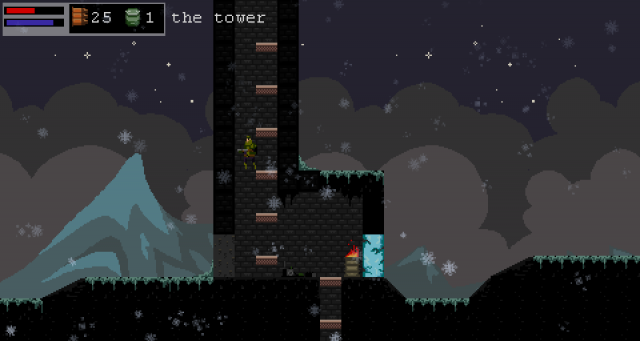Elsewhere in the indie gaming world, some games created on even smaller (or non-existent) budgets have also been celebrated, in a competition that is a race against time.
The Ludum Dare 48 hour game competition tasks individual developers to create a game based around a theme within 48 hours. The theme for Ludum Dare #22 was ‘alone,’ and over 700 competition entries were received, including a new game from Minecraft developer Markus Persson.
Persson’s Minicraft, a top-down resource gathering game, garnered a lot of publicity for the event but failed to make the overall top 50. It did finish in 49th place under the community category, though — a category that evaluates “everything you do above and beyond just making the game.”
Overall winner of Ludum Dare #22 was Frostbite, a side-scrolling exploration game written by Brazilian studio MiniBoss’s co-founder Pedro Medeiros. It is set in a frozen post-apocalyptic world, where the protagonist goes in search of his wife while battling hunger, cold and his growing insanity. The game is a testament to what one developer can achieve in just 48 hours.
Second place went to Abandoned, an ingenious puzzle game set in an abandoned space station. The game combines object manipulation with gravity flipping, all controlled by a single laser gun.
Last Breath won third place. The game is presented in a wonderful pixel art style. The opening scene involves a tragic incident with a dog, a ball and a car, and sets up a dark journey through the underworld for the dog, now trapped in limbo. Last Breath is actually a very tricky little platform game and is surprisingly emotional given the restrictive circumstances in which it was created.
Ludem Dare also runs a ‘Jam’ alongside the main competition, which is a slightly more relaxed affair that invites teams of developers to come up with games in 72 hours. This year’s Jam winner was the fantastic Midas by Harry Lee and Jarrel Seah, from Melbourne, Australia. Midas is a puzzle game that initially looks simple but gradually reveals its complexities and demonstrates both the power and responsibility of having the ‘Midas touch’.
A notable second place in the Jam competition went to Together Alone, a game that we tipped for big things during our previous look at Ludum Dare. Together Alone is described as a “game about isolation, cooperation, and hope.” It’s short but sweet, and is presented in an incredibly polished form, given that it only took 72 hours to make.
There are no physical or cash prizes on offer in the Ludem Dare competition, but participants are actively encouraged to take their games forward by including them on gaming platforms such as iOS, Android, Steam and major flash gaming sites, such as Kongregate.
The team behind Together Alone is already taking this on board. “We’re still working on the game and will release an updated version soon. Audio issues should be fixed by then. Also, each character will have a special ability and there will be a few more levels.”
If you have the time, then go and check out some of the games at the Ludum Dare website. They are all free to play.
 Big numbers for mobile indie games
Big numbers for mobile indie games
Two independent games have reported big numbers this week, paying testament to their success on mobiles platforms.
Indie developer NimbleBit announced that its hit free-to-play building management game Tiny Tower now has more than one million unique players per day. Tiny Tower was recently named iPhone game of the year by Apple, and NimbleBit’s Ian Marsh posted on Twitter that the game is currently seeing more that 10 million play sessions every day.
Former Independent Games Festival award winner World of Goo has also been on a successful journey and has now been downloaded over 1 million times on the iOS and Mac App Store. 2D Boy reports that 17 percent of its revenue from the game came from the iPhone/iPod Touch version, with 79 percent coming from the HD version (featuring iPad support), and just 4 percent coming from the Mac App store game. It is worth noting that a separate Mac version of the game was previously released, separate from the storefront.
The Android version of World of Goo, which only launched in November 2011, has already seen 70,000 downloads of its full version and 450,000 downloads of its demo.
VentureBeat's mission is to be a digital town square for technical decision-makers to gain knowledge about transformative enterprise technology and transact. Learn More


